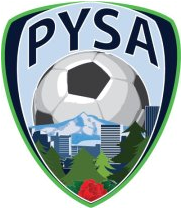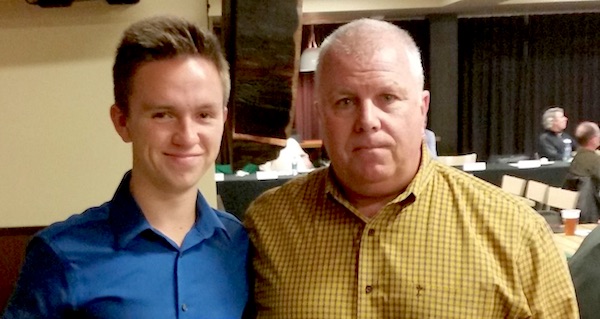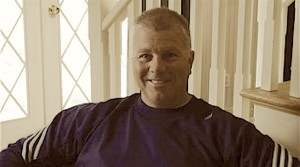SoccerToday Youth Soccer Coach Interview Series
Highly respected among his peers and all across the nation, Brett Thompson is the Executive Director at Portland Youth Soccer Association. Thompson grew up in England – his father was in the Air Force — and he started playing when he could walk. Wanting to play professional soccer in the USA, Thompson tried out with several teams in the NASL but as he says, “I thought I was good enough, but I wasn’t.” After his attempts to become a professionals soccer player, Thompson turned his passion to coaching. Thompson believes:
My job to provide the best experience for the player so they can become the best they can be no matter how far they go with the game.
Thompson’s lifetime of experiences in soccer include Executive Director PYSA, State Director of Coaching, US Youth Soccer Region 2 Girls ODP Head Coach, and US Youth Soccer National Instructor. US Youth Soccer. Coaching for decades – in fact – Thompson remembers when U.S. Soccer switched from Calendar to School year registration and now back to mandating Birth Year. A fan of the Portland Timbers, and of course, his childhood favorite Arsenal FC in the English Premier League, Thompson is a strong advocate of small sided games, wishes he could have the super power to open people’s minds to embrace new ideas and believes youth soccer should be about the players — not the adults or big profits.
 As part of SoccerToday’s ongoing series on Top Coaches, here is our interview with Brett Thompson.
As part of SoccerToday’s ongoing series on Top Coaches, here is our interview with Brett Thompson.
Diane Scavuzzo: What has coaching taught you?
Brett Thompson: When I first started I was in a rush to get educated, in a rush to help players, in a rush about everything, I wanted to change the soccer world NOW.
I have learned that it is the journey that is so important – to appreciate all of the challenges and rewards along the way. This takes that horrible four letter word TIME.
Diane Scavuzzo: What is your coaching philosophy?
Brett Thompson:
- To treat each player as an individual in a team environment
- To create an environment where the player can learn the game, much like a classroom
- To challenge the player to push through their comfort zone
- To empower the player to make decisions in the game and at practice
- To ask questions, not give answers to the player — essentially guiding the youth soccer players to the answer. I like the Socratic method of teaching
- To help the player both on and off the field become the player and person they want to be

Diane Scavuzzo: How has soccer changed since you became involved?
Brett Thompson: The game of soccer is still the same — what has changed is youth soccer clubs have become more professional with new positions such as Directors of Coaching, Asst, DOC, Gender Specific DOC’s, Age group specific DOC’s etc. Some soccer clubs are pushing 500k to 1 million dollars through their bank accounts.
The pay-to-play model muddies the waters. Today, many “employees” (A/K.A coach’s) mortgages, car payments are on the line and with parents becoming more “involved” in their child’s game. It is harder for some clubs to focus on what is the best thing to do for a child rather than the winning.
 Many parents today may not understand the idiosyncrasies of the game and the long-term path of player development — they only know to look at the win/loss column and equate that to development. As a result some parents pressure coaches and clubs to win or they leave and join a club or team that is GOOD (WINNING).
Many parents today may not understand the idiosyncrasies of the game and the long-term path of player development — they only know to look at the win/loss column and equate that to development. As a result some parents pressure coaches and clubs to win or they leave and join a club or team that is GOOD (WINNING).
Youth soccer clubs have a dilemma; do they try to win and educate that parent(s) over time or do they focus on development at those younger ages and allow parents to leave?
Diane Scavuzzo: What is the biggest problem in youth soccer today?
Brett Thompson: I agree with John O’Sulllivan of Changing the Game. The biggest problems in youth soccer today are:
- Problem #1: Parents who won’t let the game belong to kids
- Problem #2: Athletes need to OWN their decisions, both good and bad
- Problem #3: Coaches who fail to respect the kids and the sport, and ignore the massive impact they have on athletes’ lives
- Problem #4: Youth Sports Organizations that Serve Adult, Not Kids
 Diane Scavuzzo: What was your biggest failure?
Diane Scavuzzo: What was your biggest failure?
Brett Thompson: I think my biggest failure were with the first couple of teams I coached. I don’t think I did those first couple of teams any favors and they are my biggest regret as I cannot go back and fix what I did.
In the beginning, I carried every loss and every win on my shoulders. I took the game way to seriously. It was all about ME. I was way too competitive and I was THAT COACH on the sideline.
Diane Scavuzzo: What do you look for in a player? What are the most important traits in a youth soccer player?
Brett Thompson: I believe the most important traits in a youth soccer player are — in order of importance:
- Coach-ability
- Technical
- Soccer IQ
- Athleticism
- Tactical
- Work Rate
Diane Scavuzzo: What makes a coach successful?
Brett Thompson: In the competitive playing environment world, a coach’s success relies on players progressing, getting better and inspiring players to want to work on their own.
Diane Scavuzzo: What can U.S. Soccer do to help soccer be more successful in the USA?
Brett Thompson: U.S. Soccer can help parents understand the process of player development and encourage clubs to teach the game the right way.
U.S. Soccer should come out with a grading scale for youth soccer clubs: A Platinum, Gold, Silver and Bronze rating.
The awards would be based on performance standards of a Model Soccer Club. This would give parents the information to make an informed decision – basically a Good Housekeeping Seal of approval.
Diane Scavuzzo: What do you think about the new U.S. Soccer mandates?
Brett Thompson: As a former State DOC, I always wanted U.S. Soccer to take a stand and mandate player development issues.
Unfortunately, the U.S. Soccer mandates were issued without the full cooperation of the Youth governing bodies — and, we can all see the fallout now.
 Diane Scavuzzo: What do you think about the U.S. Soccer Birth Year Mandate?
Diane Scavuzzo: What do you think about the U.S. Soccer Birth Year Mandate?
Brett Thompson: This part of the mandates has been handled the worst by U.S. Soccer.
I have coached long enough to remember back when it was Calendar Year registration and we moved to School Year registration many years ago.
The reason given by U.S. Soccer for this move now is aimed at an extremely small percentage of USA players. This sweeping change has lost its way on what soccer is for 99.5% of the kids in this country. Right now ODP and the Academy programs are already using birth year, and these are the kids US Soccer is looking at…
I think this was a huge mistake.
Diane Scavuzzo: How do you think small-sided games will benefit development?
Brett Thompson: I have been a huge proponent of Small Sided Games (SSG) for years. It is truly the way to go in developing our players as well as keeping players engaged in the game at the early age groups.
Also for those novice coaches in recreational soccer, it is easier to practice and coach in the SSG environment as the coaches themselves also learn the game.

Diane Scavuzzo: Who is your role model or mentor?
Brett Thompson: Gary Allen of Virginia Youth Soccer Association took me under his wing and was a great mentor. He challenged me on virtually every thought I had and asked me WHY??
Clyde Watson of McLean Soccer in Virginia was a great mentor. He taught me how to enjoy the game for what it provides, the beauty, the cheekiness of players and also use the challenges that are presented as growing opportunities. The biggest thing he taught me was not to carry the loss and wins on my shoulders and to sit and enjoy the game.
And, lastly my wife Nancy, she encouraged me to take the leap and do what I loved to do and leave the corporate world behind. When we talked about me doing soccer full time I told her I would not make as much money and we would have to move. Her answer, “We will just have fewer things – I just want you to be happy”.
Diane Scavuzzo: If you could pick any superpower, what would it be and why?
Brett Thompson: I would love to have the superpower of changing the minds of people who are closed-minded. I know it does not exist but that is what I would want. Closed minds hinder progress, trust me, I was closed minded many years ago and I hindered both mine and players progress.
Photo Credit: Portland Youth Soccer Association Facebook and Brett Thompson
Originally Published February 19, 2016






